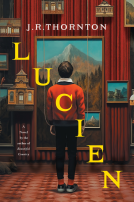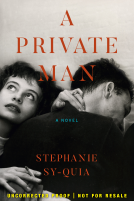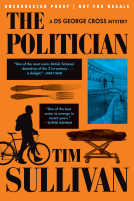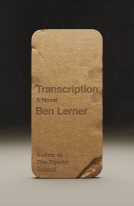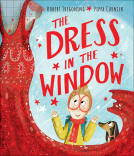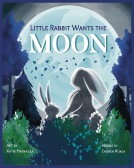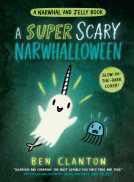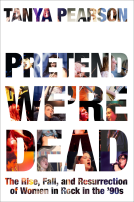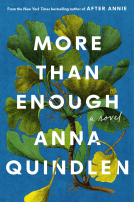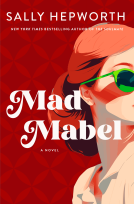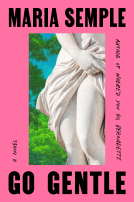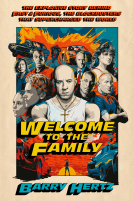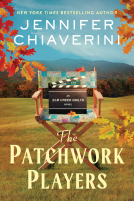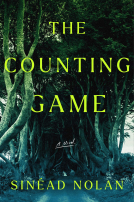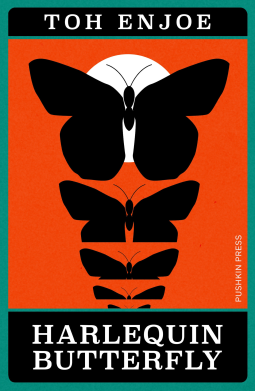
Harlequin Butterfly
by Toh, EnJoe
This title was previously available on NetGalley and is now archived.
Send NetGalley books directly to your Kindle or Kindle app
1
To read on a Kindle or Kindle app, please add kindle@netgalley.com as an approved email address to receive files in your Amazon account. Click here for step-by-step instructions.
2
Also find your Kindle email address within your Amazon account, and enter it here.
Pub Date Mar 05 2024 | Archive Date Dec 17 2023
Talking about this book? Use #HarlequinButterfly #NetGalley. More hashtag tips!
Description
This delightfully surreal novella follows the global pursuit of a mysterious writer who somehow writes in dozens of languages.
An affluent entrepreneur named A.A. Abrams sinks seemingly infinite resources into the global pursuit of a writer about whom very little is known. Abrams’ target, known as “Tomoyuki Tomoyuki,” moves from one place to another, producing work in the local language before moving on to another part of the world.
But how does Tomoyuki Tomoyuki move from one language to the next with such ease? Agents employed by the Abrams Institute attempt to make sense of the writer’s erratic movements and baffling writing habits, but come to find that within each puzzle is yet another puzzle, waiting to be unraveled. One puzzle leads to another in this delightful literary caper.
Available Editions
| EDITION | Other Format |
| ISBN | 9781782279778 |
| PRICE | $14.95 (USD) |
| PAGES | 160 |
Available on NetGalley
Average rating from 37 members
Featured Reviews
I loved this short book. It's unique, spellbinding, captivating, and extremely creative. The whole time I was reading it, I was trying to figure it out, and at the end, I finally did - I think. Books that make me think rank high in my list. This book made me think, and was entertaining. It's experimental fiction, it's literature, and it's fantastic.
What a peculiar little book. I'm not sure where it started or ended. In fact I'm not entirely sure you couldn't just finish it and begin again immediately without noticing the join.
The story, such as it is, winds all over the place, changing characters names, gender, purpose, future and past. The eponymous butterfly may or may not be real as are the strange characters that inhabit the book.
The blurb suggests a book about a polyglot who writes strange books and a man called AA Abrams search for this strange author. The reality is so much stranger than that.
I am struggling to describe any of this book but I think that may well be the point, at least I hope so. Anyway if you like strange Japanese literary fiction then you will like this. I enjoyed it but (like Sayaka Murata's work) I couldn't exactly define why. I just did.
Thanks to Netgalley and Pushkin Press for the advance review copy.
 Candie M, Reviewer
Candie M, Reviewer
This book is about the pursuit of a mysterious author around the world by an affluent entrepreneur and their corporation.
This was an oddly fascinating yet confusing read. Highly likely the format contributed to how the story started off weirdly for me; it was a bit of a mess at first but I grew into it about a quarter in. I would consider this read very fast-paced and smooth. The magical realism of how the characters intertwined was quite a rollercoaster ride and alluring, with hints of mystery and talks of languages and fantasies. Throughout the book I kept wondering how it was going to end, and I ended up liking the conclusion.
 Reviewer 1262813
Reviewer 1262813
The story is slippery and weird and hard to catch but it was exactly the kind of weird I love most in books. Reading this book made me happy and I want to reread it soon! This is one of those rare books that make me feel like I see eye to eye with the words on every page; it‘s probably not for everyone but for some it will be a perfect fit.
 Reviewer 1276887
Reviewer 1276887
It was a clever and amusing story about the relationship between art, and commerce. It jumps around perspectives so at time I got a little lost with which character I was reading. However, for those of you who like unconventional stories that play with story structure, I would recommend this book.
"Imagine a story - one that's utterly meaningless, contradictory, incoherent. What if there's a language somewhere in the world that would render that story logically sound? A language in which that story would become perfectly ordinary, all its strangeness concealed from view?"
For the first two-thirds of the book, I was quite lost. It reads in a jarring, strange, nonsensical way, leaving you unsure of what you read even a page or a paragraph before, and even more unsure of where it could possibly be going from there. It certainly seemed to be utterly meaningless, contradictory, incoherent...
and then, it clicked. There was a language, an 'aha moment' that translated the meaning & rendered the story (a bit more) logically sound. The conclusion brought it full circle (at least, I think it did?), and I enjoyed the way the writing kept me fully engaged and constantly thinking.
By the end, I was surprised to find myself enjoying it. This book won't be for everyone, but for those who enjoy lyrical, non-traditional structure, it will be as delightful as catching a butterfly in your net.
Thanks to Netgalley and Pushkin Press for the ARC!
Wow, what a book. There is no beginning or end, it appears to loop infinitely. I am truly mystified.
A.A. Abrams, a wealthy entrepreneur, is on the hunt for a mysterious writer who can write in any language, publishing all around the world. The trail is unpredictable and puzzling.
The blurb of the book only scratches the surface of what this story is about. From the start, you as the reader try to make sense of this magical world, and the possibilities within it. Symbolism is often blurred with reality. It feels like the story is playing mind games with the reader. If you’re up for the challenge, and enjoy creation discussed in complex metaphors, I recommend giving this a read.
Thank you to Netgalley and Pushkin Press for this ARC.
This was a highly unusual but entertaining novella. The main character is chasing after an author known as Tomoyuki Tomoyuki who has written many books in local languages for very specific settings. As other reviewers have pointed out, this novella is a bit hard to describe because it is so abstract. It's a short read but don't expect a clear plot or an ending. This kind of reminds of some Roberto Bolaño's more abstract work with a hint of Haruki Murakami's style. It might be a good read for a short flight or while waiting at the airport. I give it 3.5 stars, which rounds up to 4.
A wonderful and Borgesian novel about an elusive writer who travels the world writing a book in any and every language. This was a surreal and whimsical dream of a novel which celebrates the delight of writing, translation and creation. The section that discusses how contradictory language might make sense in a non textual or non English format was so enlightening. I found myself gasping at some of the creative and literary imagery that was created. Like The Library of Babel this novella celebrates the diversity of writing and crafting ideas. It dances around structure, gender and conventional storytelling and instead challenges our perception of how we have come to know stories. Really loved this one and will want to read more from the author.
 Nicky M, Reviewer
Nicky M, Reviewer
An interesting novel that's very experimental, meta-fictional, and phenomenological. It's reminiscent of Murakami, Borges, and Nabokov. The plot is hard to explain, but it's partly about a writer who writes for very specific moments, books for traveling, books for being underneath a dog. It's also about the strangeness of living and how we try to put that into words. I enjoyed this short novella.
 Dan O, Bookseller
Dan O, Bookseller
My thanks to both NetGalley and the Pushkin Press for an advance copy of this different little story about language, publishing, the need for people to have answers, and the reason why many of us read books.
When I first began reading books, everything had a straight kind of narrative. A to B to C. The comics I was reading about the same time, sometimes veered in weird directions, but I expected that from comics a visual medium. I just assumed books followed an order. No matter what language. As I got older and expanded my reading palate books began to get bigger in ideas, and I realized that books sometimes didn't play fair. And I began to look harder for these kinds of books. Harlequin Butterfly is probably one of the most unique books that I have come across, and one that I can't wait to share with others. Written by Toh EnJoe and translated from the Japanese by David Boyd, the book is a about a global conspiracy to find an author whose artistic gift is that they can write a book in any language, and the search for this savant. Maybe.
What about a book that can be only be read when traveling is out first sentence, depending on if one starts at this chapter. The book is sort of an ouroboros, in that one can start at any chapter and get a story that might be same, only slightly different. My version went like this. A wealthy patron has spend ghastly amounts of money on an institute to find a writer. This writer has an ability to write books in numerous languages, moving from country to country, writing a book, and moving on. The patron who set this whole thing up passed away from constantly flying in pursuits of the author, or in pursuit of ideas that are captured in a silver net. That might not have been made yet, or if made is sitting in an antiques house waiting for the right person. As chapters end new narrators are introduced maybe, with the polyglot writer being one of them. Maybe.
A book that for all its slim sized, hits hard with the ideas that it is jammed wth. The book has a bit of learning curve. I suggest just going with it. Tis a very fun ride. Toh EnJoe keeps the story moving, more importantly he doesn't lose track of the story, nor where the plot is going. Even when it circles around again. The translation is very good, I'm sure this must have been a task to try and keep straight and present. I recently read Same Bed, Different Dreams by Ed Park, and there is a same sort of hallucinationary feeling to both books. Both try to tell a story that is bigger than words, about something that could change life for people. A really amazing reading experience.
Recommended for people who like to work when they read, who want more than A+B=C, and love to be amazed but what a simple grouping of words can make one person think. A great novel, one that one could read a few times and get different things from.
A novella about ideas, languages, writing, and travel. It swaps characters, points of views, I’m not sure I know who was the writer and who were the characters, it’s circular and very clever. Tiny butterfly nets for catching ideas, a writer who learns other languages and writes in them, agents sent around the world to find the mysterious writers works and much more. An enjoyable short read.
Harlequin Butterfly (Feb 2024) by Toh EnJoe and translated by David Boyd, is such a strange little book, although I thought it sounded a little familiar. It made me wonder because I'm pretty sure I haven't read the original Doukeshi no Chou before. Then I suddenly remembered reading an excerpt of both the original and translation on Asymptote, an online literary journal, several years ago. A quick search shows that it's still there; it's by a different translator though.
I also remembered seeing one of EnJoe's short stories in Gunzo, one of the major printed literary journals in Japan. I forgot which issue. Might need to check later. Other than that, I don't think I have ever read anything else by him in Japanese.
It's worth noting that Doukeshi no Chou was a joint winner in the 146th Akutagawa Prize (works published in the second half of 2011).
Anyway, I like Harlequin Butterfly for its themes of writing and languages. The story focuses on a global search for a mysterious writer called Tomoyuki Tomoyuki, a polyglot who writes in several languages. The elusive writer is always ahead of those looking for him, including one entrepreneur A.A. Abrams who has invented a kind of net to catch ideas. Literally or figuratively, I'm not sure.
The butterfly mentioned could be imaginary for all I know, but I think it represents ideas. Maybe Tomoyuki Tomoyuki is also like the butterfly that eludes capture. I really don't know. It's very abstract and occasionally convoluted, even nonsensical. I haven't read anything quite like this. Yet I couldn't stop reading it, and managed to finish it within 3 hours.
Pushkin Press has published a number of Japanese novellas since last year, and I must say, it's really an exciting collection. Looking forward to read more. I got this review copy of Harlequin Butterfly via #NetGalley.
 Librarian 203616
Librarian 203616
Harlequin Butterfly by EnJoe Toh is in interesting novella. As the reader goes from chapter to chapter, the point of view is continually shifting. Or, is it? It is a book I plan to reread because while I couldn't put it down, I still felt like there was more to be gleaned from the text. Very enjoyable for fans of metafiction.
How do you finish, or come to rate a story, that has no beginning or end? This short story is bizarre; and yet its cadences, ideas of where ideas come from, musing on different languages, and general abstract ideas are quite intriguing. I suspect one could read this book ten times over and still be putting the pieces together in the end.
I’d you want an over the top literary story which loops on itself then grab this. For many it won’t be something they enjoy, or even really get (I’m not sure I fully grasp a lot of it myself) but it could perhaps make you think.
I wonder if this story could be as a way to break out of writers block? Would the story of stories and idea of ideas be a way to capture the butterfly and break the cycle of writers block? Or would you just get more frustrated with the situation if you got caught in the cyclical natural of the story itself?
There are probably thousands of musings like this that could be applied to this weird little piece. Alas, I have more things to read and cannot spend my life on this conundrum (such as our characters have). But gosh was it interesting to visit it for an hour or two.
Please note: I received an eARC of this book from the publisher via NetGalley. This is an honest and unbiased review.
 Alan M, Bookseller
Alan M, Bookseller
Extraordinary.
Some thinking later, I'm still not sure what to say. It's 'easy' to summarise - a wealthy entrepreneur called A.A. Abrams seeks out an enigmatic writer called Tomoyuki Tomoyuki, who leaves behind trails of writing but never in the same language, changing location and language every so often.
But, actually, that isn't really what it's about. Or it is, but it doesn't really matter what it's about. It's all about the act of reading, of letting go and just going with the flow. The book becomes a metaphor for itself - as we read about trying to capture meaning (sometimes in an imagined or ancient 'net') then in that process itself we become the characters, trying to find meaning. Shifting narratives and a plot that seems to shift in time, this is definitely the kind of book that will divide opinion. Oh, and it passed me by until after I had finished and was doing some wider reading - I'll just say the name Nabokov. And butterflies. That's all.
For me, this is why I love the explosion of translated fiction, and especially Japanese fiction, in recent years. Publishers like Pushkin Press should be venerated and lauded for what they have done, and bringing this gem of a piece to a wider audience is a remarkable thing to behold.
Dazzling, confusing, lyrical and sublime, this is one of the most elusive and best books that I have read in many years.
(With thanks to the publisher and NetGalley for an ARC of this title.)
 Jennifer J, Reviewer
Jennifer J, Reviewer
This was definitely a blur of a novella, however felt like it really had a lot to say. I will be unwrapping and thinking about this one for quite some time as I have never read anything like this. I would describe this as a circular book as you could really start this at any of the five parts and it would still be cohesive and mesmerizing. This would be an interesting read for a book club and I will be interested to see what others think about this book. Thanks for the ARC, NetGalley.
This is the kind of book you have to read twice to really get who is who, what is what, where the story begins and where it ends. An intriguing short novel.
Thanks to Pushkin Press for the Advance Review Copy.
Harlequin Butterfly is a fascinating little piece of metafiction that, on the surface, follows the philanthropist A. A. Abrams as they become obsessed with discovering the identity of the polyglot author Tomoyuki Tomoyuki. But it’s also about so much more than that—it’s about translation and language, duplication and replication, about time, about fate and eventuality, and about paradox and the multilayered semantic possibilities of language.
If that sounds like a lot to jam into a novella that isn’t even 100 pages long, that’s because it is. And in large part Toh EnJoe is able to discuss so many ideas and probe at so many themes in such a slim volume because of the way that many of the typical elements that we come to expect from literature are absent here. The characters are somewhat slippery, with names and gender changing from chapter to chapter. The plot itself is equally amorphous, and while there is a persistent through line connecting the chapters to one another, the novella is constructed in such a way that chronology and order mean very little. In fact, I appreciated this book the most when I began to think of it as a series of loosely connected short stories that could likely be read from any arbitrary starting point.
And while all of this may seem like I’m trying to say that Toh EnJoe got sloppy with the plot and characters, I’m really trying to argue the opposite. Everything in this book felt remarkably intentional, in such a way that indicates a really great understanding of the underpinnings of literature to a point where he is able to deconstruct them so acutely. While reading, I got the sense that I wasn’t supposed to be taking the novella at face value so much as I was meant to be reflecting on what it means for something to be literature and on how the novella made me feel about language itself. There are some very interesting paradoxes developed throughout that get at this idea of taking a collection of words and sentences and paragraphs that are all grammatically sound but semantically impossible, which is an experience in literature that’s very tricky to explain but thrilling to witness.
The irony of reading a book that is so centered on semantics and meaning and the production of literature in translation is not lost on me. Strangely enough, the act of reading it in translation simultaneously weakens the original text and adds additional nuance and layering. There’s something ironic about translating a work in which, at one point, a character asks herself if it is even possible for a work in translation to maintain its original meaning and intelligibility. And so I, a reader who is reading a book in English that was originally written in Japanese, am forced to ask myself that question about the very book I hold in my hands. And that’s an exciting thing to think about when you’re reading!
There’s something very experimental about all of this. I don’t think I could necessarily say that I *liked* this book, but I also never felt like it was a book that is meant to be liked or disliked. It made me think, and ask questions, and consider my relationship to literature and language in really interesting ways. Short and sweet, but it still has me mulling over these ideas over a week after finishing it.
Thank you to NetGalley and Pushkin Press for the e-ARC of this novella!
 Hannah K, Reviewer
Hannah K, Reviewer
I'm a sucker for recursive meta writing, and this ends up fitting that bill perfectly. Each of the four parts of this novella actually also mirror the stages of a butterfly's life, and it leans hard into the surreality while it's at it. If the publisher ends up publishing more by this author, I'd definitely be interested.
First published in Japan in 2012; published in translation by Pushkin Press on March 5, 2024
Harlequin Butterfly seems more like a series of thought experiments than a novel. It might best be viewed as a meditation on language. Make of it what you will. Most of the Japanese fiction I’ve read has been accessible to my western sensibility, but Harlequin Butterfly is a bit of a puzzle. I don’t know if that’s because of a difference in culture or if my mind is simply too dull to appreciate Toh EnJoe’s story.
A. A. Abrams is a frequent flyer. In fact, flying is about all he does. When the plane is in the air, Abrams removes a small net made of silver thread that he uses to capture fresh ideas. In no other location are ideas as plentiful as those that come loose in the cabin of a jumbo jet. The net is later said to catch luck or opportunity, but in the beginning the net captures ideas that only exist mid-journey, ideas that are left behind as the body moves forward.
A passenger sitting next to Abrams (in coach, where all the best ideas are found) apparently narrates the first chapter. The narrator can’t read on a plane (or any other form of transportation), perhaps because her thoughts can’t keep up with the speed of the vehicle. Thoughts flitting out of heads moving at a high speed may explain why ideas are most easily captured on an airplane. Speaking to the passenger, Abrams conceives the idea of a book that can only be understood when the reader is flying. Abrams writes To Be Read Only on an Airplane, a book that oddly gains traction among readers who are traveling by sea on luxury liners.
Abrams reappears later in the novel, sometimes in a different gender, once at an earlier time. At some points Abrams is alive and at others is remembered in death. And then we learn that someone else (probably) wrote To Be Read Only on an Airplane — unless the alternate author is actually Abrams in a different guise.
In the second chapter, the focus shifts to Tomoyuki Tomoyuki, an author who has written books that are meant to be read only under specific circumstances, including (you guessed it) while traveling. Most have gone unpublished. They are written in multiple languages including a simplified version of Latin — invented by a mathematician — that nobody speaks. To Be Read Only Under a Cat achieved some success after reading it became the trendy thing to so.
In this chapter, it seems that Abrams is a fictional character who appears in To Be Read Only Under a Cat. Yet there seems to be an Abrams Institute that is tracking down and collecting (and maybe stealing) Tomoyuki’s work. Whether Abrams is real or imagined, whether Abrams or Tomoyuki writes the books (or each writes them independently), doesn’t seem to matter as Tomoyuki understands reality to be relative and fluid.
One of Tomoyuki’s works seems to be a meditation on writing. He explains that he writes because he likes the sound of certain words linked together, a sound “that makes me write things I wasn’t even thinking.” Harlequin Butterfly often comes across as a stream of strangely connected thoughts. Perhaps Toh Enjoe didn’t realize he was having those thoughts as he composed the novel.
Another chapter analogizes kitchens to dictionaries. Both are full of ingredients. When you don’t have the right ingredient, you can make do with another. Ingredients can be combined in various ways and some combinations are preferable to others. The sound of an ingredient (coriander) sparks memories of many things all at once: smells and colors and people and the “bustle of life.”
Language is also analogized to needlework, stitches creating something new, expanding like a conversation, “twisting and turning until the day is over.” Stitching with an old woman helps the narrator learn the woman’s language. Like needlepoint or any craft, writing is an act of creation that might be finished or unfinished, its form “constantly changing, cycling through the stages of transformation, setting new life in motion.” The narrator wonders whether a story written in one language might be incoherent but make perfect sense when translated into another.
These are interesting ideas. I’m not sure they add up to a coherent story but the ideas themselves call the notion of coherence into question. Each chapter of Harlequin Butterfly seems to have a different narrator, although it also seems that they are different forms of the same narrator. At some points, it seems that the story’s narrator is searching for Tomoyuki. At some points (sometimes the same points), it seems the narrator might be Tomoyuki. The final chapter suggests that the narrator is someone (more precisely, something) entirely unexpected.
I’m recommending Harlequin Butterly for its strangeness. Readers who expect stories to have straightforward narratives that are easily understood will want to steer clear of the novel. Readers who appreciate the power of language might be entertained by the EnJoe’s invitation to perceive that power in new ways. Readers with time on their hands might want to read it twice, as I suspect a second reading would contribute to the reader’s understanding or appreciation of the novel’s narrative structure.
RECOMMENDED
Proving for the trillionth time that the best stories are those about stories, this short but delightful book quickly proposes several questions to the reader: Can we record the process of learning a language in real time? Can it be done in the same language that is being learned? Is knitting like writing? And if so, is it translatable? Are there books that can only be understood in specific situations, like being on a plane or under a cat? And how can such books be written? By following the shifting and nebulous identities of a nomad writer, a detective of writers, and perhaps a couple more hard-to-identify bystanders, we may catch some priceless ideas the way one catches a butterfly: with a delicate net, preferably one woven from thoughts.

